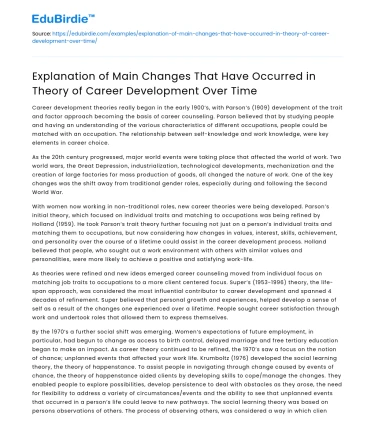Career development theories really began in the early 1900’s, with Parson’s (1909) development of the trait and factor approach becoming the basis of career counseling. Parson believed that by studying people and having an understanding of the various characteristics of different occupations, people could be matched with an occupation. The relationship between self-knowledge and work knowledge, were key elements in career choice.
As the 20th century progressed, major world events were taking place that affected the world of work. Two world wars, the Great Depression, industrialization, technological developments, mechanization and the creation of large factories for mass production of goods, all changed the nature of work. One of the key changes was the shift away from traditional gender roles, especially during and following the Second World War.
Save your time!
We can take care of your essay
- Proper editing and formatting
- Free revision, title page, and bibliography
- Flexible prices and money-back guarantee
With women now working in non-traditional roles, new career theories were being developed. Parson’s initial theory, which focused on individual traits and matching to occupations was being refined by Holland (1959). He took Parson’s trait theory further focusing not just on a person’s individual traits and matching them to occupations, but now considering how changes in values, interest, skills, achievement, and personality over the course of a lifetime could assist in the career development process. Holland believed that people, who sought out a work environment with others with similar values and personalities, were more likely to achieve a positive and satisfying work-life.
As theories were refined and new ideas emerged career counseling moved from individual focus on matching job traits to occupations to a more client centered focus. Super’s (1953-1996) theory, the life-span approach, was considered the most influential contributor to career development and spanned 4 decades of refinement. Super believed that personal growth and experiences, helped develop a sense of self as a result of the changes one experienced over a lifetime. People sought career satisfaction through work and undertook roles that allowed them to express themselves.
By the 1970’s a further social shift was emerging. Women’s expectations of future employment, in particular, had begun to change as access to birth control, delayed marriage and free tertiary education began to make an impact. As career theory continued to be refined, the 1970’s saw a focus on the notion of chance; unplanned events that affected your work life. Krumboltz (1976) developed the social learning theory, the theory of happenstance. To assist people in navigating through change caused by events of chance, the theory of happenstance aided clients by developing skills to cope/manage the changes. They enabled people to explore possibilities, develop persistence to deal with obstacles as they arose, the need for flexibility to address a variety of circumstances/events and the ability to see that unplanned events that occurred in a person’s life could leave to new pathways. The social learning theory was based on persons observations of others. The process of observing others, was considered a way in which clients could learn new behaviors, values and attitudes, and that in turn these could lead to a better understanding of oneself.
By the 80’s Bandura (1986) took the skill of observation further to include imitation and modeling with his development of the social cognitive career theory. Krumboltz’s learning theory of career counseling followed. It helped people gain a deeper understanding of the choices that influenced how a person made career decisions. Counselors encouraged clients to explore new options based on developing new interests and capabilities. They taught strategies and helped develop new skills to cope with an ever, changing work landscape. Guidance was given to challenge clients on the choices they made. With the use of assessment tools, clients explored their own beliefs, skills, values, interests and personality to create satisfying lives for themselves.
Towards the end of the 20th century and into the 21st Patton and McMahon (1999) developed a systems theory framework. This was a tool that could be used in qualitative assessment and as part of a reflection process. This theory connected how an individual’s ‘life system’, was influenced by their ability, values, ethnicity, age, personality and self-concept, and that in combination they could impact career choice. Here the counselor and client work together to gain an understanding of the various factors that have influenced career decisions and assist in formulating future goals.
Career counseling has moved away from a focus on just job and personality traits, to a client focus approach in which many factors are explored. Changes to career theory have been influenced by research form other fields of study, research in career behavior and the changes to the world of work. We have come to look at work as more than an income and a necessity. We have grown to question and reflect on our lives, how the nature of work and the experiences we gain from work have affected us, our view of ourselves and our values, and how our choices affected by all these factors, internal and external, have led us through our career journey.






 Stuck on your essay?
Stuck on your essay?

